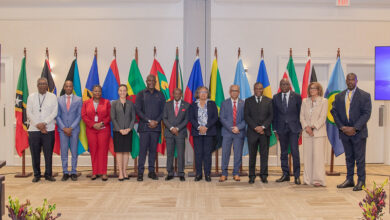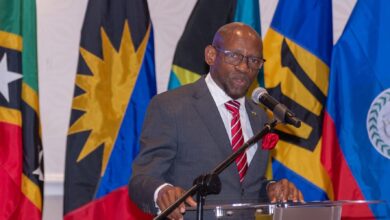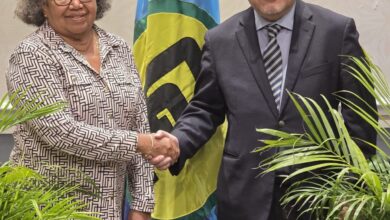The Fifth Meeting of the Council for Foreign and Community Relations (COFCOR) was held in Castries, Saint Lucia on 6-7 May, 2001. The Ministers attending were: the Hon. Sir Ronald Sanders, Chief Foreign Affairs Representative with Ministerial Rank, Antigua and Barbuda; the Hon. Billie Miller, Deputy Prime Minister and Minister of Foreign Affairs and Foreign Trade, Barbados; the Hon. Elvin Nimrod, Minister of Foreign Affairs and International Affairs, Grenada; Hon. S. R. Insanally, Minister of Foreign Affairs, Republic of Guyana; the Hon. K.D Knight, Minister of Foreign Affairs and Foreign Trade, Jamaica; Senator the Hon. Julian R Hunte, OBE, Minister of External Affairs, International Trade and Civil Aviation of Saint Lucia; the Hon. Louis Straker, Deputy Prime Minister and Minister of Foreign Affairs, Commerce and Trade, St. Vincent and the Grenadines; and Senator the Hon. Knowlson Gift, Minister of Foreign Affairs, Trinidad and Tobago.
Also representing their respective countries were: His Excellency Lawrence Sylvester, Ambassador of Belize to the Caribbean Community; His Excellency Simon Jones-Hendrickson, High Commissioner of St. Kitts and Nevis to the Caribbean Community, the Organisation of Eastern Caribbean States and the Association of Caribbean States; Her Excellency Manorma Soeknandan, Ambassador of Suriname to Guyana and CARICOM.
Haiti was represented by the Hon Jean-Phillipe Antonio, Minister of Foreign Affairs.
OPENING CEREMONY
In his remarks at the Opening Ceremony, the Secretary-General of the Caribbean Community (CARICOM), Mr. Edwin W. Carrington made the point that it was the Council for Foreign and Community Relations that most exemplified and represented the essence of the Caribbean Community.
He stressed that any successful strategy for the Region's improvement required the full participation of all sectors of the society.
“We must now be prepared to act together and not be afraid to be ready to take and act upon bold decisions to improve the lives of our peoples,” he said. He added that the Region now had to face the most formidable challenges in its modern history. “How we fare in those negotiations, and emerge from those struggles, for believe me, life threatening struggles they are, will certainly depend on the quantity and quality of our involvement in this process.”
In his address, the outgoing Chairman, Honourable S.R. Insanally, Minister of Foreign Affairs of Guyana, said that of all the occurrences during the past twelve months, there was no more earth-shaking event than the September 11 attack on the United States.
“Eight months later its after-shocks are still being felt throughout the world and more especially in the Caribbean which, because of its proximity to the target, is particularly sensitive to the continuing tremors,” he added.
Minister Insanally also said the Region faced a new set of political and economic realities created in the aftermath of the tragedy and it was as if overnight a new world order had been established which required compliance with different rules and regulations. He added that regional diplomacy must now be galvanised to revive the flagging economies of the Community.
The Minister posited that the new realities required the Community to review and re-fashion its foreign policy coordination and diplomatic efforts to make them more suited to present circumstances. He suggested that, comprehensiveness, coherence and cogency should characterise the Region's efforts at foreign policy coordination.
In his feature address, the Minister of Foreign Affairs of Saint Lucia, Senator the Hon. Julian R. Hunte, in his capacity as Chairman of the COFCOR, noted that the meeting was convened against the backdrop of continuing international political, social and economic instability marked by a virtual war in the Middle East, continued global economic recession, the devastating impact of pandemic diseases especially HIV/AIDS; and growing transnational crime.
The Minister noted there was much happening around us – “certainly much that will affect us, and certainly, much that would require from us, the definition and articulation of common or, at the very least, coordinated responses.”
“Our Community of States must be seen to act as a community in the true sense of the word and not be viewed by the outside world as simply a collection of countries which happen to be in the same geographic area. There must be singularity of purpose, and complementarity of actions, in dealing with the multifaceted issues created by outside actors and factors,” he said.
CARICOM'S FOREIGN POLICY STRATEGY
Ministers reviewed the Community's approach to the objectives of the Treaty of Chaguaramas relating to the coordination of the foreign policies of Member States. They reaffirmed that the Community will continue to be guided by a set of fundamental principles, including the development and preservation of the Caribbean identity, democratic system and economic space; the sustainability of small states within the international community; continued adherence to principles of good governance; maintaining the peace, security and territorial integrity of the Community; adherence to the purposes and principles of the United Nations; and adherence to Treaty commitments.
Ministers also noted that development goals and objectives must shape the bilateral and multilateral diplomatic relations of the Community, and that adjustment challenges and the modernisation and transformation imperatives of our economies and societies are strongly influenced by global hemispheric political processes and initiatives.
In the context of the Single Market and Economy, and in accordance with a revised Treaty of Chaguaramas, greater consultation and coordination of the foreign policies of the Region were needed. This would require an effective decision-making machinery, consistent and positive engagement in areas selected for priority of action, and the capacity to deliver.
In this regard, Ministers agreed to strengthen the operations of the Bureau of the COFCOR to enable the Community to address issues in the Community's interest on a timely basis.
REVIEW OF GLOBAL POLITICAL AND ECONOMIC ISSUES
The Ministers reviewed the global, political and economic issues that impacted on the Region over the past year. Discussions focused on issues relating to small states, terrorism and development assistance; democracy; poverty; HIV/AIDS; the environment, and activities in the Region's three major theatres of negotiation, the World Trade Organisation (WTO); the Free Trade Area of the Americas (FTAA); and the African, Caribbean and Pacific/European Union (ACP/EU) process.
VENEZUELA
Ministers reviewed recent developments in Venezuela and agreed to issue the attached Statement on those developments.
MEETINGS
Summit of the Americas
The Ministers noted the Region's participation to date in the Summit of Americas process. They reiterated that the issues relating to the financing of the mandates arising from the Summit continue to be of concern to Member States. They agreed on the mechanisms for further cooperation by the Community in following up the Summit process and recognised that there was a need for greater coordination by CARICOM in addressing the policies and work programmes of the Summit Partners institutions. They welcomed the inclusion of the Caribbean Development Bank (CDB) in the implementation process of the mandates of the Summit of Americas.
Association of Caribbean States
The COFCOR discussed the objectives and outcomes of the 3rd ACS Summit in Margarita Island, Venezuela. They recognised that the ACS had developed over the past six years from CARICOM's conceptual vision to the reality of a Zone of Cooperation of the Greater Caribbean. They commended the Minister of Foreign Affairs of Barbados for her leadership role of the ACS, as Chairman of the Ministerial Council during 2001, and noted that Belize will be hosting the ACS Ministerial Council in December 2002.
CARICOM-Spain Summit
Ministers reviewed the status of the preparations for the 2nd CARICOM-Spain Summit which is scheduled for 16 May 2002 in Madrid. They emphasised that the dialogue would be used to promote issues of special concern to the Community, such as those related to the EU-LAC process, the implementation of the Cotonou Agreement, issues in the United Nations system, and multilateral financial issues.
EU-LAC Summit
The Ministers reviewed the preparations for the Second European Union/Latin America and Caribbean Summit which will bring together the leaders of forty-eight countries on 17 May 2002 in Madrid, Spain. They welcomed the convening of the Summit which provides the opportunity to enhance the bi-regional partnership and to sensitise their Latin American and European Union partners to matters of concern to the people of the Caribbean. They looked forward to the possibility of participating fully in all aspects of the Summit, formal and substantive.
Financing for Development
Ministers acknowledged the many new concepts and competing frameworks in the follow-up process to the Financing for Development Conference. They noted that a number of issues had not been satisfactorily addressed at the Conference including cooperation on international tax matters; special and differential treatment for smaller economies; increased technical cooperation and the role of the World Trade Organisation (WTO) in the development agenda defined by the Financing for Development follow-up process.
They mandated their representatives to participate fully in the high-level dialogue on strengthening cooperation for development through partnerships.
World Summit on Sustainable Development (WSSD)
Ministers considered preparations for the World Summit on Sustainable Development which is to be held in Johannesburg, South Africa, from 26 August to 4 September 2002. They affirmed their expectations that issues relating to small island developing states (SIDS) would receive full consideration by the Summit and would be reflected in the final document of the Summit.
OAS ISSUES
Ministers welcomed the hosting of the XXXII Session of the General Assembly of the Organisation of American States in Barbados, a Member State of the Community, from June 2-4, 2002.
They recognized that the General Assembly would have on its agenda a number of matters relating to the political and economic development as well as the security of the hemisphere. They looked forward to advancing the work of the Organisation in these areas. Of particular concern was the situation in Haiti where the Community has been playing a lead role within the Organisation.
BORDER ISSUES
Belize-Guatemala
The Ministers received a report from the Belize Representative on the progress of the Facilitation Process under the auspices of the Organisation of American States to achieve a definitive settlement of Guatemala's territorial claim to Belize.
They noted that the Facilitators are expected to submit their proposals for settlement for the consideration of both Governments.
They encouraged both parties to continue their commitment to work towards a definitive settlement and reiterated their firm support for the territorial integrity and sovereignty of Belize.
Guyana-Venezuela
Ministers reaffirmed their support for the preservation of Guyana's territorial integrity and its sovereign right to develop all of its territory.
They noted with satisfaction the renewed commitments of Guyana and Venezuela to the Good Offices procedure established by the United Nations Secretary General in accordance with the Geneva Agreement.
The Ministers welcomed the recent reactivation of the High Level Bilateral Commission and expressed the hope that this mechanism would lead to the further development of friendly and cooperative relations between the two countries.
Bird Rock
Ministers discussed Bird Rock in relation to the delimitation of maritime areas in the Eastern Caribbean between several CARICOM Member States and Venezuela. They declared their support for the maritime integrity of affected Member States of the Community, and called for discussions with Venezuela to be based on applicable international law.
They re-affirmed the centrality of the UN Convention on the Law of the Sea to the successful resolution of the issues.
RELATIONS WITH THE UNITED STATES
Ministers reviewed the outcomes of the Third Meeting between Ministers of Foreign Affairs of the nations of the Caribbean and the US Secretary of State, and stressed the importance of further strengthening the Caribbean's relations with the USA. They expressed appreciation for the Third Border Initiative announced by President George W. Bush during the Third Summit of the Americas held in Quebec City, Canada, in April 2001. The Ministers noted that the Third Border Initiative is based on the concept of a partnership between the Caribbean and the USA, recognising that there is an inter-dependence between the two partners. The Ministers formulated a Caribbean perspective in response to the elements proposed by the United States Government.
RELATIONS WITH BRAZIL
Ministers welcomed the fact that the President of the Federative Republic of Brazil had been invited to have an exchange of views with CARICOM Heads of Government at their next meeting in Georgetown, Guyana, from 3-5 July 2002. They indicated that the opportunity of the President's visit could be taken to explore ways in which CARICOM/Brazil cooperation could be promoted for the mutual benefit of the peoples of the Community and Brazil.
Ministers acknowledged the important role of Brazil in hemispheric and international relations.
They also noted the potential for developing economic and cultural linkages with Brazil as part of the Community's expansion of its relations with Latin America.
RELATIONS WITH THE UNITED KINGDOM
Ministers expressed satisfaction with the outcome of the Third Caribbean-UK Ministerial Forum and adopted steps to be taken in support of the establishment of the transmission mechanism proposed by the Forum.
RELATIONS WITH CENTRAL AMERICA
Ministers discussed the follow-up process for the First Summit between CARICOM, The Central American Integration System (SICA), and the Dominican Republic which was held in Belize City, Belize, in February 2002.
They considered measures to be included in a plan of action designed to achieve the objectives of the Summit and looked forward to their meeting with Foreign Ministers of Central America and the Dominican Republic in Barbados in June 2002.
RELATIONS WITH JAPAN
Ministers expressed satisfaction at the successful outcome of the Eighth CARICOM/Japan Consultations held in Antigua and Barbuda in March 2002, and at the support being given by Japan to the social and economic development of the Member States of the Community. They urged Member States and their Private Sectors to play an active role in the series of activities which are being planned to showcase the Caribbean Region in Japan in November 2002.
The Ministers noted that fundamental differences still exist between the two Parties on the issue of the transshipment of nuclear waste through the Caribbean Sea and the potential threat this poses to the well-being and environment of the Region.
TRANSHIPMENT OF NUCLEAR AND
RADIOACTIVE WASTE THROUGH THE CARIBBEAN SEA
Ministers considered the issue of the continued passage of nuclear waste through the Caribbean Sea, including reports that another such shipment is imminent. They issued a Statement on this issue, which is attached.
CANDIDATURES
Ministers endorsed the Candidature of Saint Lucia for the Presidency of the United Nations General Assembly (UNGA), that position now falling to the turn of the Latin America and Caribbean Group (GRULAC) at the United Nations (UN). They agreed to give full support to Saint Lucia.
They also endorsed the bid by Trinidad and Tobago to host the site of the FTAA Permanent Secretariat. Ministers also took positions on a number of requests for support made by other countries for a wide spectrum of candidatures.
HAITI
Ministers were informed of recent Organisation of American States (OAS) initiatives in Haiti. They noted the improved collaboration between CARICOM and the OAS on these initiatives and agreed that CARICOM should remain fully involved in the OAS Haiti process.
They reiterated the Community's call for the release of funds to Haiti held by the International Financial Institutions.
They received information from the Government of Haiti on measures being taken to satisfy a number of conditions set by the international Community, including the OAS and the US, and commended the Government for its efforts to date.
They noted that negotiations between the two main Haitian political parties would soon resume and agreed that CARICOM should continue its role as a co-facilitator with the OAS in the process.
Ministers expressed the hope that the CARICOM-OAS Mission to Haiti from 12-14 May 2002, would be successful in its undertakings.
FREE MOVEMENT
Ministers took note of the concerns expressed regarding the imposition of travel restrictions on CARICOM nationals within the Community and urged the Secretary-General to use his good offices to hold consultations on the matter and to take steps to pre-empt, through dialogue, the possibility of similar action by Member States or Associate Member States. The Ministers recalled the provisions of the Revised Treaty of Chaguaramas which relate to the Free Movement of CARICOM nationals in the Region, and agreed that this Treaty provision should be drawn to the attention of regional immigration officials.
GOVERNANCE
Ministers discussed the issue of Governance and connected concepts which are often advocated in the Global arena. Ministers observed that the international Community was often guilty of double standards in the manner in which the principles of good governance were applied in making judgements on the situation in individual states.
They also expressed concern that the reputation enjoyed by the Community as a bastion of democracy and good governance was in danger of being eroded. The Ministers however strongly reiterated the Community's commitment to democracy and good governance.
APPRECIATION
Ministers expressed their deep appreciation to the Government and people of Saint Lucia for the excellent and warm hospitality offered them during their stay which enabled the efficient conduct of the meeting.
DATE AND VENUE
The Ministers accepted the offer of St. Vincent and the Grenadines to host the Sixth Meeting of the COFCOR in that country on 8-9 May 2003.
Castries, Saint Lucia
7 May 2002
*****
STATEMENT OF THE COUNCIL FOR FOREIGN AND COMMUNITY RELATIONS (COFCOR) ON THE SITUATION IN VENEZUELA
The Council for Foreign and Community Relations (COFCOR), meeting in Castries, St. Lucia on May 6-7, 2002, expresses its satisfaction at the restoration of constitutional order and the democratically elected government of President Hugo Chavez Frias in the Bolivarian Republic of Venezuela. The COFCOR rejects the use of force in any form as a means of changing the constitutional order.
The COFCOR deeply regrets the loss of life which accompanied the recent events in Venezuela and regrets also the economic losses occasioned thereby.
The COFCOR expresses the hope that the restoration of peace and stability will continue to the benefit of the people of Venezuela, and welcomes the call made by President Chavez for unity and reconciliation. The COFCOR anticipates the participation in good faith of all sectors of Venezuelan society in this process and urges all parties to respect the norms of democracy and constitutional order.
The Member States of the Caribbean Community stand ready to offer their support and solidarity to the Government and peoples of Venezuela, in facilitating the process of reconciliation.
Castries, Saint Lucia
7 May 2002
*****
STATEMENT OF THE COUNCIL FOR FOREIGN AND COMMUNITY RELATIONS (COFCOR) ON THE TRANSHIPMENT OF NUCLEAR AND RADIOACTIVE WASTE THROUGH THE CARIBBEAN SEA
The Council for Foreign and Community Relations (COFCOR), meeting in Castries, St Lucia on May 6-7, 2002, registers its deep concern and consternation at reports that two nuclear transport vessels are currently en route to Japan through the Caribbean Sea to undertake the most controversial nuclear shipment in history, that of returning to Sellafield, in defiance of international law, a rejected cargo of deadly plutonium MOX fuel. The likelihood of the return journey also transiting the Caribbean Sea is of grave concern to the Foreign Ministers.
The COFCOR stresses that the events of September 11th, 2001, and the subsequent public revelations that nuclear options have indeed been explored by terrorist groups, clearly demonstrate that the threat of nuclear accident or nuclear terrorism is very real. In these circumstances, and at a time when the international community is so heavily focused on security issues, it is inconceivable that these dangerous shipments should be allowed to continue on a routine basis, without regard to the obvious and escalating risks to which they expose all societies in their transit path.
The COFCOR expresses its deep disappointment at the lack of adequate prior notification of these shipments and at the absence of any comprehensive environmental impact assessment on this matter undertaken by the shipping or receiving states.
The COFCOR warmly welcomes the initiative taken by the Government of Antigua and Barbuda in requesting a study by the OAS of the implications for the safety and security of coastal states posed by the transshipment of nuclear wastes through their marine space. It is also heartened by the legal challenge undertaken by the Irish Government against the shipments and the close attention being paid by countries of the Pacific Forum to this issue. It recognized the efforts being made by the Panamanian Environment Committee to have legislation adopted which would prohibit nuclear transports from using the Panama Canal. It offers its full support to this initiative, and expresses its hope for the early adoption of the relevant legislation by the Panamanian Congress.
The COFCOR reiterates, in the strongest possible terms, its implacable and steadfast opposition to the continued use of the Caribbean Sea for the transshipment of nuclear waste. It urges those responsible to respect the clearly expressed wishes of the Governments and peoples of Caribbean Basin states to desist from this practice which represents the most devastating threat to the safety and security of the region. For their part the Caribbean Governments vow to examine every possible legal and other recourse to halt this dangerous practice which the current international security environment has rendered even more unacceptable.
Castries, Saint Lucia
7 May 2002
*****
STATEMENT ISSUED BY THE COUNCIL FOR FOREIGN AND COMMUNITY RELATIONS OF THE CARIBBEAN COMMUNITY (COFCOR) ON THE SITUATION IN THE MIDDLE EAST
Ministers expressed their deep concern at the continuing instability in the Middle East and at the tragic loss of innocent lives occasioned thereby. They strongly supported the call for compliance with UN Security Council Resolutions, a complete end to the occupation and the cessation of all forms of violence.
They deeply regretted that the United Nations Commission of Enquiry had not been permitted to carry out its mandate to investigate the events in Jenin. They noted with interest the latest developments in the Israel/Palestine conflict, and expressed the hope that the window of opportunity afforded by those developments would facilitate the resumption of negotiations towards a political settlement.
Castries, Saint Lucia
7 May 2002





